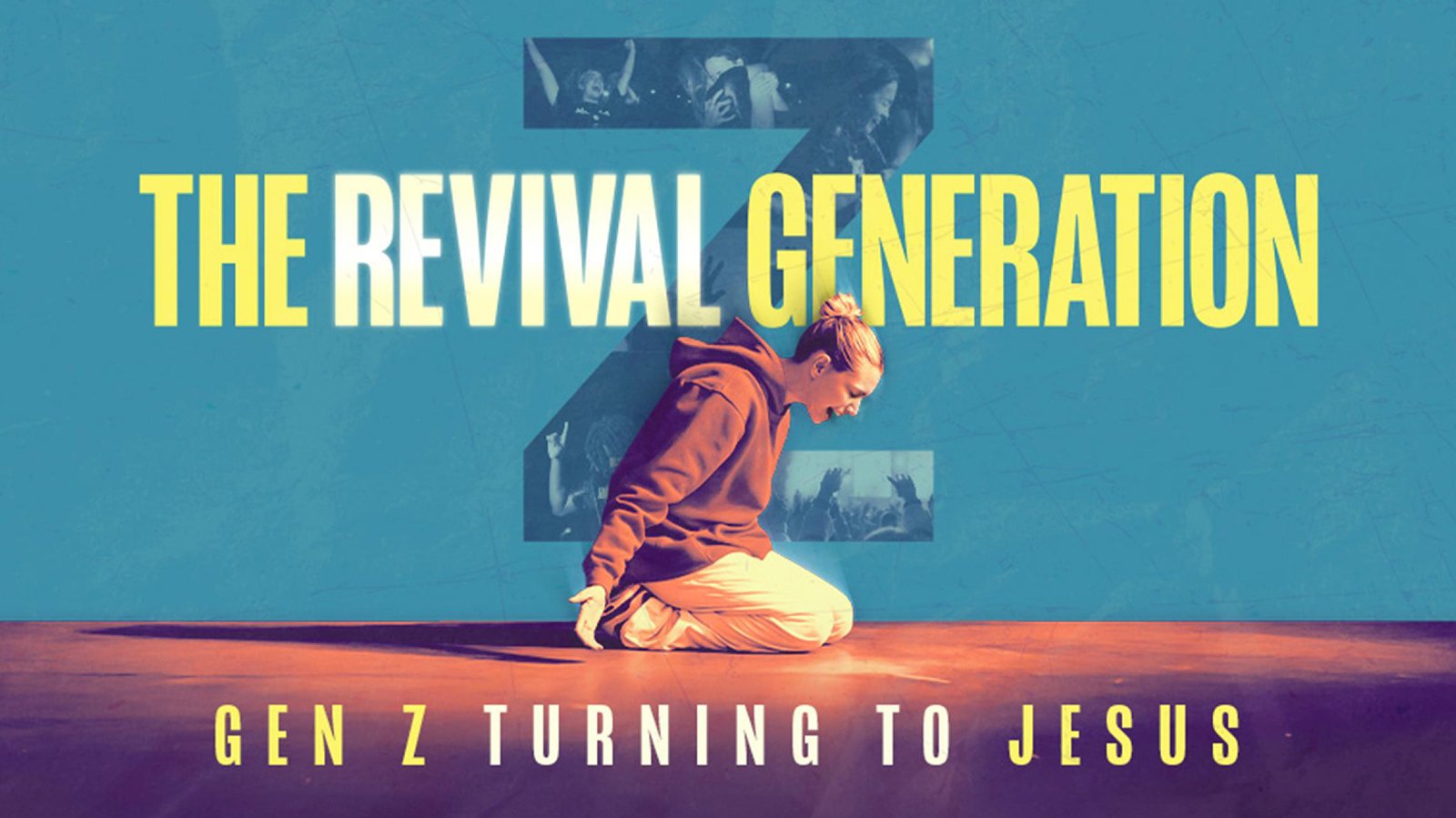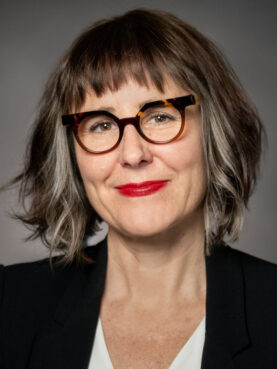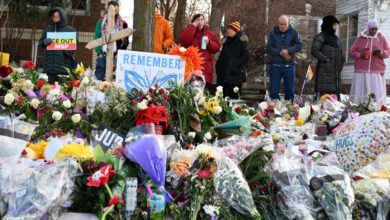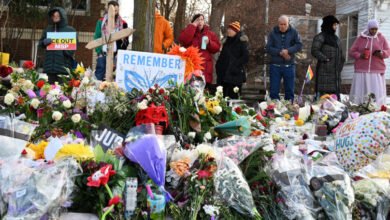(RNS) — On Aug. 27, over a thousand attendees lifted their voices in worship at Washington, D.C.,’s Kennedy Center as part of a red-carpet premiere of a new documentary, “The Revival Generation: Gen Z Turning to Jesus.” As the notes of the last song faded, Abigail Robertson, granddaughter of famed televangelist Pat Robertson and producer of the film, took the stage to praise God for the Christian revivals taking place around the globe.
“May this be the first of many events like this at the Kennedy Center. May you use this place mightily to continue to glorify your name, Jesus,” prayed Robertson.
The event was emblematic of both the center’s new Trump-led pivot toward faith-friendly content and of the kind of evangelical fervor featured in the documentary itself. The film focuses on the revivals hosted by UniteUS, a nonprofit that facilitates worship, evangelistic gatherings and baptisms at college campuses. Thanks to their efforts, the documentary claims, 13,000 college students have made “decisions to receive Christ.” The documentary frames these revivals as evidence of a broader spiritual shift happening among Gen Z “Zoomers.”
“I know that a lot of the media is typically covering Gen Z in a pretty negative way,” director Laura Hand told RNS. “I saw the opposite to be true, seeing these young people with such a passion and hunger and true joy, spreading the gospel. I think that is very emblematic of what is happening to Gen Z at large.”
Experts told RNS it’s common for each generation to experience a referendum on their religiosity when they reach their 20s, with scholars and spectators staking their hopes, fears and expectations on the next group of young adults. It’s no different for Gen Z, which has been pegged as being both more and less religious than older generations. The truth, religion scholars say, is more complex, with several trends emerging as Zoomers’ spiritual loyalties develop. By dubbing Gen Z “The Revival Generation,” this documentary seeks to counteract the negative narratives defining Gen Z, filmmakers said, depicting them not as anxious and isolated, but as leaders of a spiritual movement.
The film itself is a product of CBN (Christian Broadcasting Network), a right-leaning Christian media organization that’s been covering the UniteUS revivals since they began in fall 2023. The documentary begins with the story of Tonya Prewett, a mother who started a small group for women at Auburn University in Auburn, Alabama, in early 2023. She was moved by the girls’ stories about depression, suicidal ideation and addiction and grew the five-person small group into a prayer group with hundreds of students.
In September 2023, Prewett, in partnership with local pastors and college administrators, hosted the inaugural UniteUS event at Auburn’s Neville Arena. An estimated 5,000 students attended the event, which featured worship, sermons and an altar call.
“I went back up and shared the gospel, and there was a girl that wanted to be baptized,” said evangelical Bible teacher Jennie Allen, one of the event’s main speakers, in the documentary. “And off stage, (Prewett) and I are talking, going, ‘what do we do about this? Could we baptize her nearby?’”
Afterwards, a thousand students reportedly gathered at a nearby pond over a half mile away to watch hundreds of their peers get spontaneously baptized by Allen and the Rev. Jonathan Pokluda, who also spoke at the event.
At first, Prewett thought the viral event was a one-off. But soon, students at other colleges asked to host Unite on their campuses. Unite events began popping up at colleges across the U.S., especially in the Bible Belt. So far, UniteUS has held events at over a dozen U.S. schools, the majority at state schools in the South. In early 2025, CBN began embedding a film crew to document the revivals.
“It was 17 degrees outside,” recalled Robertson, who attended her first Unite event at the University of Kentucky in February. “Still, hundreds of students, after the event, were getting in these baptism troughs, and not just deciding to give their lives to Jesus Christ that night, but then taking it a step further — despite the freezing cold weather — and getting baptized.”
Bringing these free events to campuses is no small feat. UniteUS now functions as a nonprofit, and according to tax forms, all key employees, excluding Tonya Prewett, work on a volunteer basis. College students interested in hosting Unite fundraise for associated fees; according to the documentary, the cost of these events, including arena rentals and production costs, can reach into the hundreds of thousands of dollars.
Robertson and director Laura Hand said those being baptized are a mix of students raised in the Christian faith who are rededicating their lives to Christ and students embracing Christianity for the first time. When asked why these events are resonating, Hand and Robertson said it’s because the gospel’s emphasis on freedom from sin speaks directly to the struggles Gen Z is facing.
“I think they were seeking a sense of meaning in their lives, a sense of purpose, a sense of ‘who am I’ … and a sense of truth,” said Hand. “And I think for a lot of them who are seeking this, they were starting to find those answers in faith.”
David Kinnaman, the CEO of evangelical Christian polling firm Barna Group, told RNS Gen Z is showing “a surprising amount of religious activity.”
While most data about religion and young people shows that Gen Z are the least likely to attend services, Barna’s model recently found that Gen Z churchgoers attend more regularly than other generations. Barna’s findings are surprising, said Kinnaman, who is also featured in the documentary, given that in previous generations it was common that young people’s religious attendance would dip before it ramped up in later adulthood.
Still, Kinnaman acknowledged this is just one of many trends. As a researcher, he said, he would be hesitant to characterize what’s happening among Gen Z as a “revival.”
“It’s less about revival and more about renewal and sort of, catching back up to where the erosion happened,” said Kinnaman.
Liz Bucar, a professor of religion at Northeastern University in Boston, agreed there are many changes happening simultaneously among Gen Z. The documentary’s premise, she said, seems to align with what she has observed about some young Zoomers who are interested in more conservative, traditional or Orthodox ways of religion; these young adults appear to be “taking up a lot of cultural space,” she said, even as other Zoomers leave the church over concerns about institutional harm or misalignment with core values such as LGBTQ+ inclusion.
“I think they’re all, like, looking for meaning and some sort of stability in what is a pretty hard time to be living through,” said Bucar. In her experience, many Zoomers are reacting against the syncretic, ad hoc, New Age approach to spirituality adopted by some older generations. Instead, Zoomers are seeking more structured community, a moral framework, and want to do something about the world’s suffering. Even those not returning to institutional religion, she said, are looking for a sincere, authentic approach to spirituality that is “less extractive, more grounded in a context.”
The filmmakers agree that Gen Z is seeking meaning and purpose. That’s why, they argue, UniteUS has been so successful. Their events are supported by local churches and explicitly offer students ways of plugging in to Christian community long-term. And they believe the UniteUS revivals are all part of a much larger movement of revivals impacting students at Asbury, Ohio State and beyond.
“These baptisms are springing up everywhere. And it’s incredible to see that in this generation that has been plagued as hopeless, struggling with depression, anxiety, all of these things at levels that the prior generations have never seen before,” said Robertson. “The air is so ripe for revival, it’s so ripe for hope.”
The film is available to stream and the next scheduled stops for UniteUS are at universities in Florida, Tennessee and Arizona.
Source link








